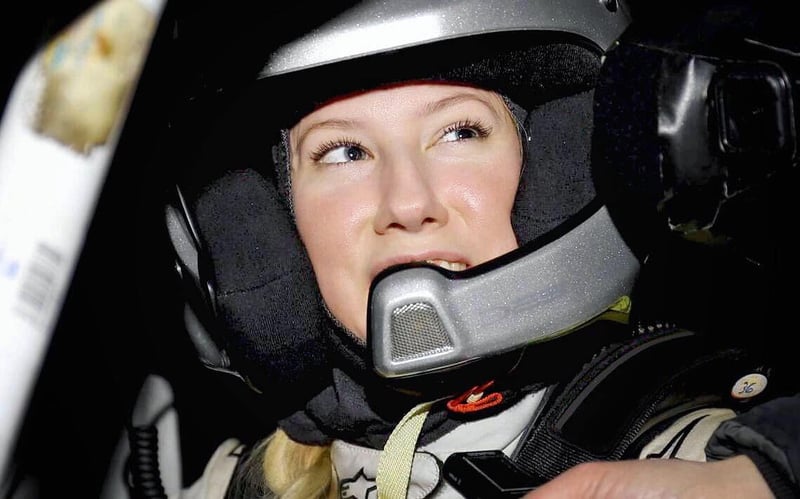About Louise
Having been in male-dominated sports and fields of study since being a teenager, Louise doesn’t see herself as particularly special when it comes to being a female in the masculine world of rallying.
An extremely intense sport, rallydoesn’t allow drivers to see the stages over and over again—rally drivers simply get two runs and have to hope that they and their co-pilots caught everything that needs attention during them. Not only that, but rally is done on some of the roughest surfaces—through forests, on ice, on tarmac or on gravel, making it one of the most extreme forms of car races!
Despite this, Louise has won rally titles including the British Rally Championship Challenge RC4 and Ladies’ title in 2010 as well as the British Rally Championship Ladies title in 2011, and is the first woman to win a FIA Rally Title that isn't gender related, gaining the FIA Production Car Cup in 2012.
However, Louise’s journey from car lover to professional driver was far from simple, and was one filled with a strong entrepreneurial spirit, courage and immense determination to succeed, regardless of any obstacles thrown her way.
Her passion for her sport has landed her among the best rally drivers in the world, no matter the gender! That is why this International Women’s Day, we’re celebrating Louise and how she works to break the bias in racing every day.
In this post you’ll learn about how Louise has earned credibility in the sport and hear her advice for future generations of rally drivers. Ready, set, go!
Getting behind the wheel
Like many young adults, Louise simply couldn’t wait to get her drivers license when she was 17.
Her parents had gifted her a little Jeep when she was 7 and her dad had always been into cars, so she spent a lot of her time at car shows when she was younger. Even though she didn’t know it at the time, one of those car shows would go on to change her life: when she went to one with a competition aimed at getting more females into rallying, she decided to enter despite having no prior driving experience—and Louise finished runner-up out of 1000 participants.
This gave her the confidence she needed to go out and get her rally license, and it came as no surprise that she easily passed the licensing tests.
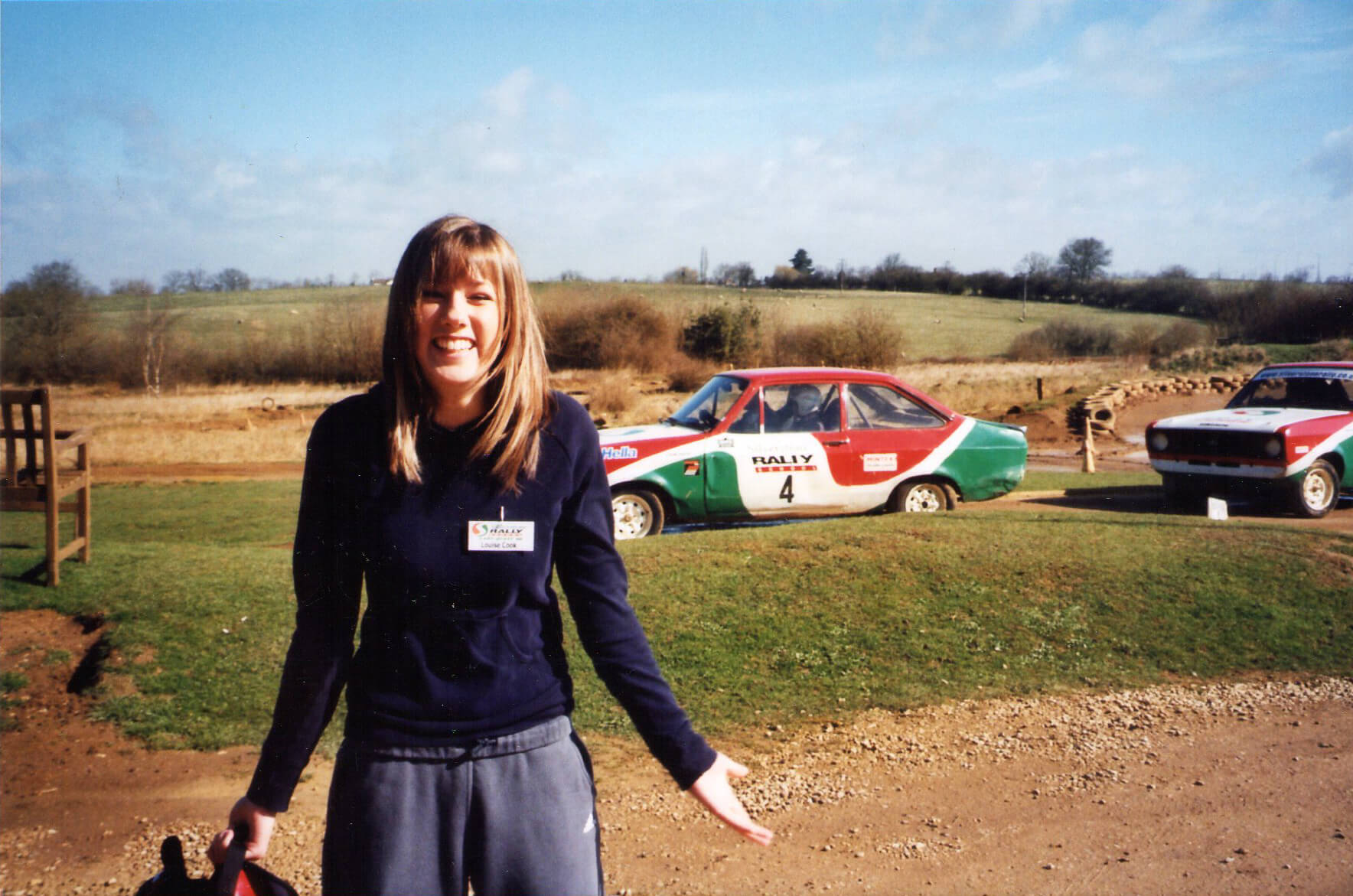
When rally & business mix
After obtaining her license, her next challenge—one that would follow her throughout her entire career—was finding the funding to begin her first formal rally season.
Having been enrolled in university at the time, she was able to use her student loan to pay for her first race. That first race cost her roughly £ 1,000—and with the cost of races simply climbing from there, Louise knew she needed to do some innovative thinking to find ways to fund her passion!
The solution came to her while at school one day. In class, she passively thought to herself: ‘if every person here could give me 1 pound, I could go rallying!’ Realistically, she knew that wouldn’t happen. That didn’t stop her entrepreneurial mind from taking the idea and growing it into something viable.
For the next little while, Louise would walk around local industrial estates and trade shows to meet with potential sponsors. She’d ask them to part with £50, and in return would offer them sticker space on her car. From there, she held competitions for sponsors to win larger branding. By doing this, she managed to accumulate nearly £15,000 and 300 sponsors!
The last thing she had to do to finance her season was sell her Ford Street KA road car—which she did, getting her first ever rally season underway.
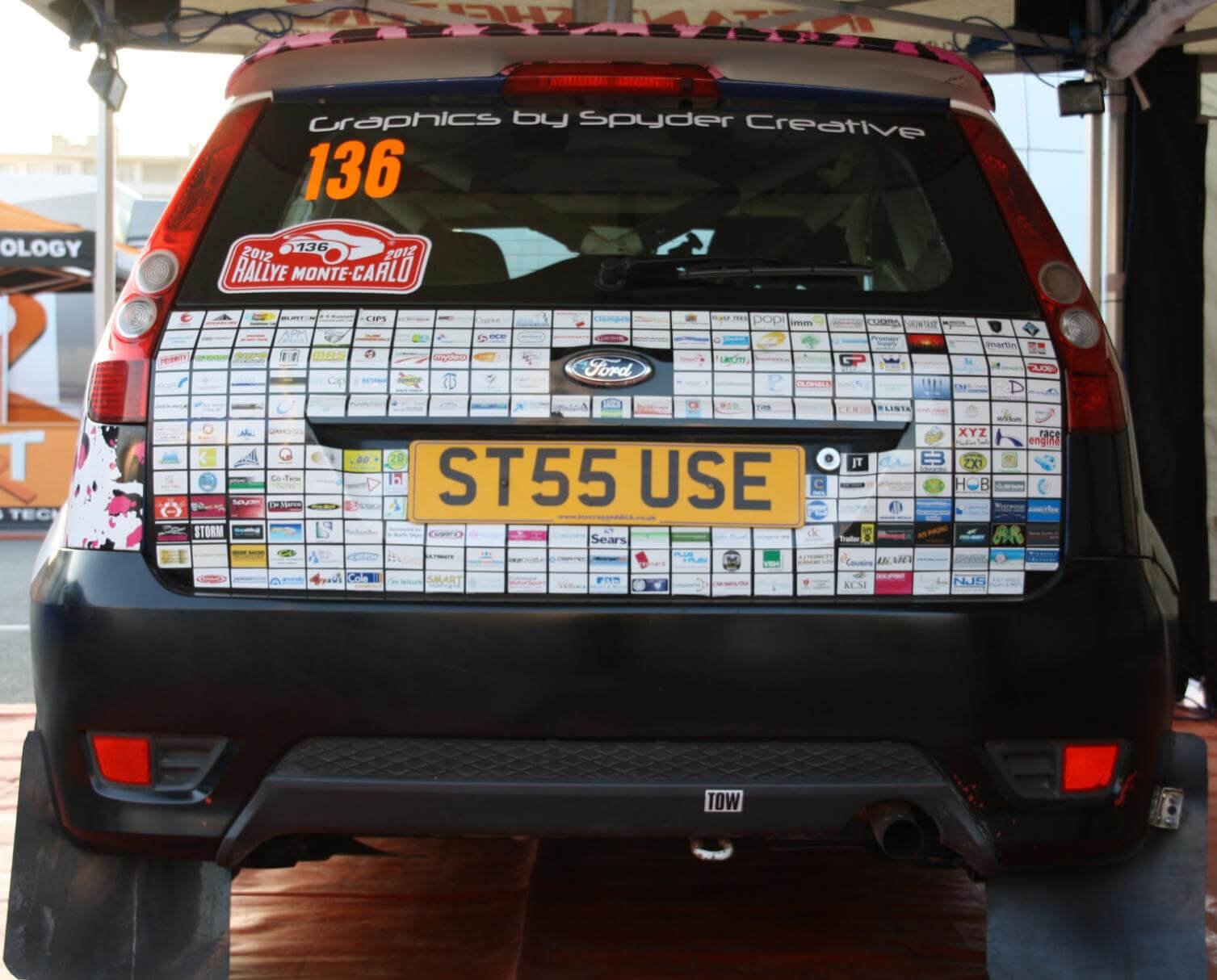
The ups and downs of relying on sponsorship
The grind to stay afloat financially unfortunately wasn’t over for Louise, even when sponsors were secured later in her career.
In 2017, she was gearing up for Rally Sweden. She had two really big sponsors lined up for the first time in her career, and her excitement was palpable!
However, tragedy struck when both sponsors had to change their financial plans just days before the race fees were due. Louise was left alone, with no means to pay for the upcoming competition.
In what was an agonizing decision, she ultimately decided to put her 2012 trophy up for sale to finance the rally—a trophy she earned for winning the FIA Production Car Cup, in which she is the first woman in history to win. Though this heartbreaking moment was unbearably difficult at the time, she looks back at it fondly today as one of the nicest moments of her career.
When her social media followers saw the trophy up for sale and heard her story, it didn’t take long for them to set up a crowdfunding page that raised close to £8,000 in 5 days. After a story on the BBC Worldwide News channel, even more donations came through—allowing her to keep her historical trophy and participate in Rally Sweden after all!
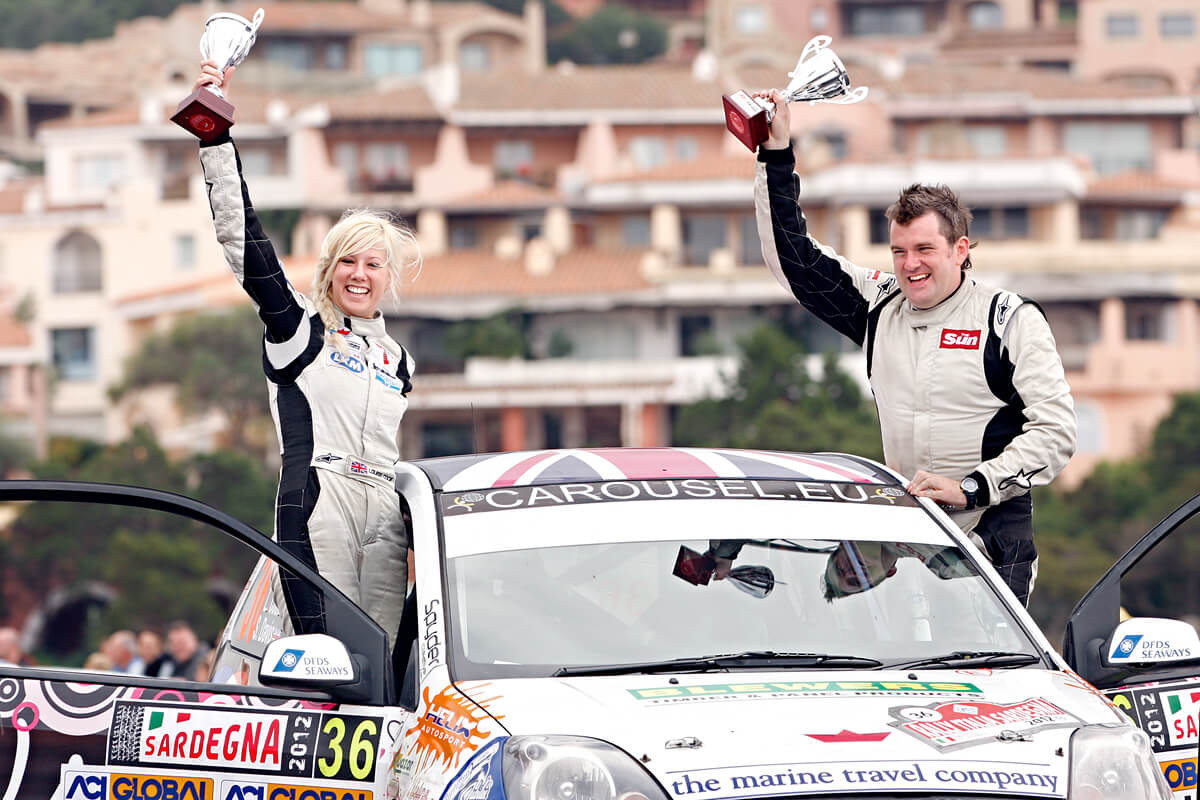
The support from social media
Not only did Louise’s fans and social media following allow her to participate in Rally Sweden, but they frequently keep her motivated!
Between teenagers that message her on Instagram and little girls who wave to her at rallies and follow her all the way through the event, she receives a lot of support from those around her. No matter how busy, Louise always tries to make time to respond to messages, spend time with the little girls and show her genuine appreciation.
There are even drivers who message her to let her know that she inspired them to get into rally and sim racing, including men—which surprises her, despite her impressive career. However, messages like these help her keep her head held high. As she puts it, “when you start out, you just want to drive a car and drive it fast. Then, you start hearing these stories where other people have been inspired to do things. It’s really nice and it inspires you to carry on as well.”
Facing the intimidation of thriving in a male-dominated sport
While Louise’s success is impressive, she is still among the rare few women who participate in rallying. To her, being a woman competing among men in rally is normal—she’s only ever experienced it as a female, so she has no other experiences to compare it to!
However, she did have one moment in her career when she was 19 that made her take a step back and go ‘woah, this really is a male-dominated field’—and it’s when she started university. She walked into a classroom studying car design, scanned it, and was shocked to find that there were only two other women in the class of approximately 150 students.
Despite that brief feeling of shock, the sport feels the same to her as it always has. She doesn’t let being one of the only females phase her, even though sometimes it comes with extra hoops to jump through!
Adjusting rally for being a woman
For Louise, one of biggest obstacles of being a woman in rally is her size. Since women, on average, tend to be smaller than men, a lot of the designated equipment doesn’t fit quite properly.
She can never see out the windscreen of her car without having to adjust her seat and re-weld bars in the car to bring it up. There’s also one only company who makes a helmet small enough for her, which limits her equipment selection.
Given these limitations, one could fairly question if women are welcomed in rally and what their place is in motorsport going forward. In Louise’s ideal world, the sport would one day get to a point where it’s 50% male and 50% female—but she doesn’t want rallies to be split by gender. To her, if you separate the two instead of having them compete side-by-side, it would be taking a step backwards instead of forwards.
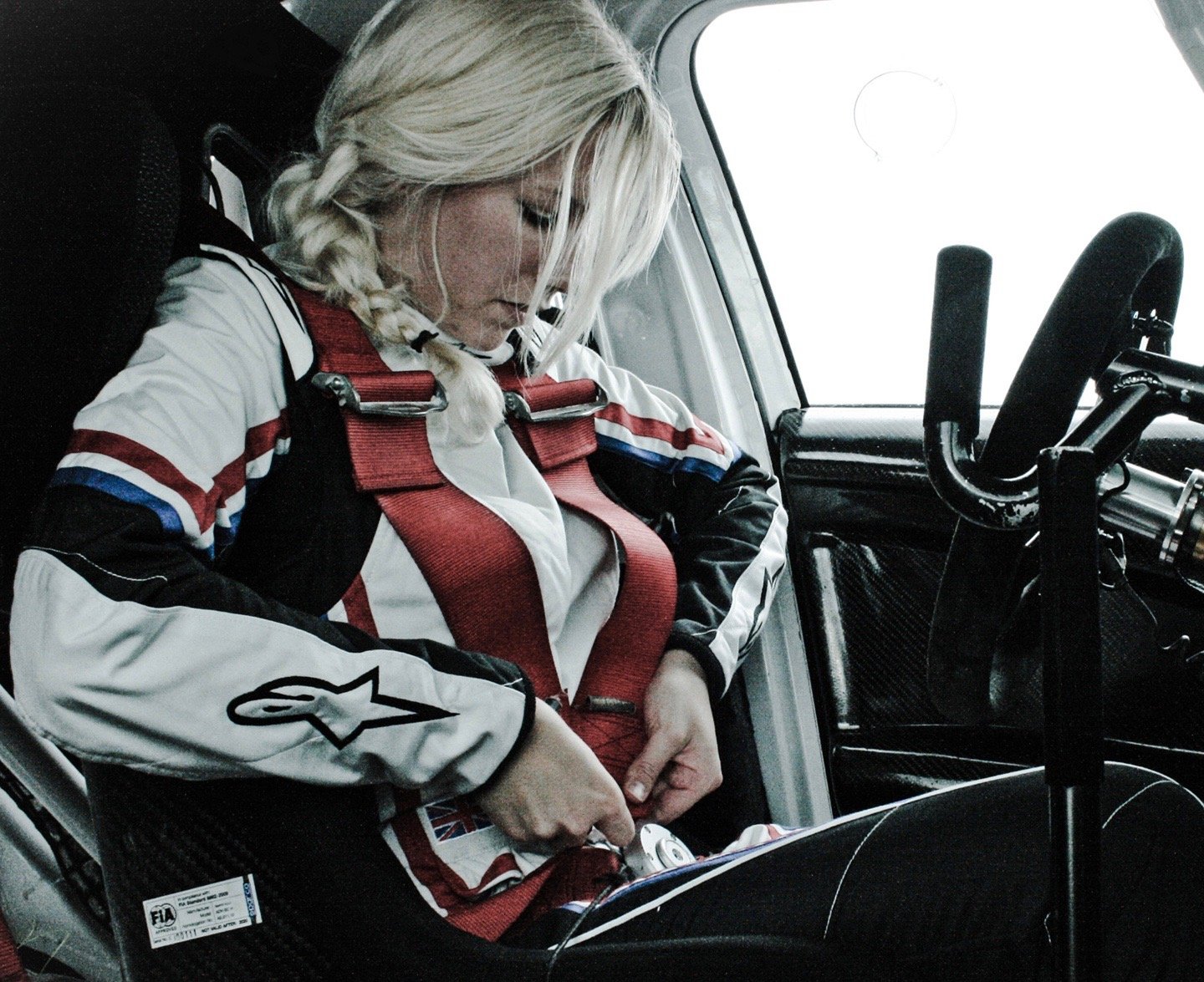
Advice for future generations of female rallyers
Louise’s advice for young women who may want to take the plunge into rally is simple and is something that she’s been doing her entire career: if you really want to go for it, don’t hold back for any reason—especially for being female.
For her, it’s also important to also not let budget get in the way—with the rapid expansion of sim racing in rally and the latest software developments, there are ways to bridge the gap between real events with less expensive training sessions using the high-fidelity haptic technology. It can help all drivers - especially those with high dedication to develop their craft, but who are without the full budget required to have the time in the car that they would like. It is possible to train on specific techniques virtually and with realistic feedback and sensation!
Finally, the biggest thing she tells herself and that she wants others to know is that it’s important to not let anything faze you simply because you’re a different gender. Take on any adversity thrown your way and keep pushing through, supporting yourself as she’s done multiple times throughout her career.
An inspiration for women everywhere
From young car lover to talented up & comer, to female entrepreneur to professional rally driver, Louise is an inspiration for women everywhere—especially those in male-dominated fields.
She’s especially inspiring to the women of D-BOX, who also find themselves in the male-dominated tech industry. D-BOX is honoured to be able to work alongside remarkable women every day and to have the ability to tell the stories of other remarkable women such as Louise!
Happy International Women’s Day!

